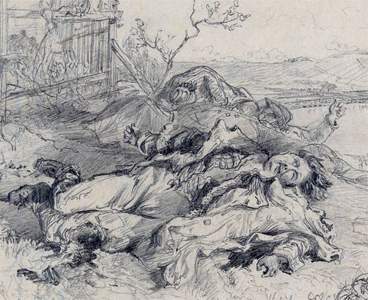William Elisha Stoker, Civil War (Lowe, 2004)
Scholarship
Once [Stoker’s division was] thrown into active campaigning in the spring of 1863, they marched and fought and maneuvered on a steady basis, seeing new places, setting up new camps, facing the terror of combat, and generally remaining active soldiers for the remaining two years of the war. That first winter in Arkansas, though, was their dark night of loneliness.
The division included more than the usual share of married men and letters to wives flowed in a steady stream from Arkansas to Texas. William E. Stoker, a farmer from the Coffeeville community of Upshur County in northeast Texas, wrote his wife even before winter set in that he was aching for home: “Betty, I cant express my feelings when I think of you and Priscilla [his young daughter]. My heart leaps, but at the same time being so fare off and cant come home and see you it almost makes my heart break.” Stoker kept his wife’s letters, but when he looked at them in moments alone, “I cant keep from weeping about you, feeling so loley bye your self.” To make matters worse, he had to face the possibility that he would never see her again.
The division included more than the usual share of married men and letters to wives flowed in a steady stream from Arkansas to Texas. William E. Stoker, a farmer from the Coffeeville community of Upshur County in northeast Texas, wrote his wife even before winter set in that he was aching for home: “Betty, I cant express my feelings when I think of you and Priscilla [his young daughter]. My heart leaps, but at the same time being so fare off and cant come home and see you it almost makes my heart break.” Stoker kept his wife’s letters, but when he looked at them in moments alone, “I cant keep from weeping about you, feeling so loley bye your self.” To make matters worse, he had to face the possibility that he would never see her again.
Richard Lowe, Walker’s Texas Division C.S.A.: Greyhounds of the Trans-Mississippi (Baton Rouge: Louisiana State University Press, 2004), 47-48.
William Elisha Stoker, Children (Lowe, 2004)
Scholarship
What [soldiers] feared most – other than the possibility that they might never see their wives and children again – was that their young children would forget them while they were away. Dozens of letters pleaded with wives to remind the children of their father, to show them a portrait… Private Stoker could not bear the thought that his beloved Priscilla might drift away from him: “Write if Priscilla has forgot me or not.” Five months later the possibility still gnawed at him. “I want to see you so bad I am nearly ded & the thoughts of Priscilas forgetting me, hurts me.”
Richard Lowe, Walker’s Texas Division C.S.A.: Greyhounds of the Trans-Mississippi (Baton Rouge: Louisiana State University Press, 2004), 58.






